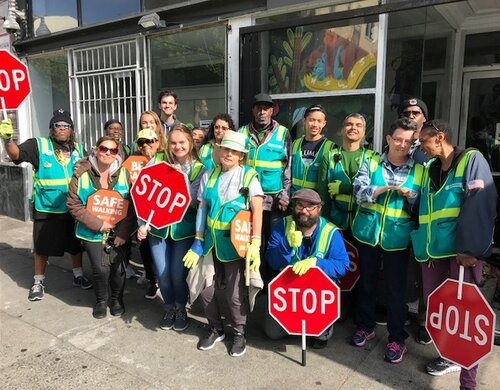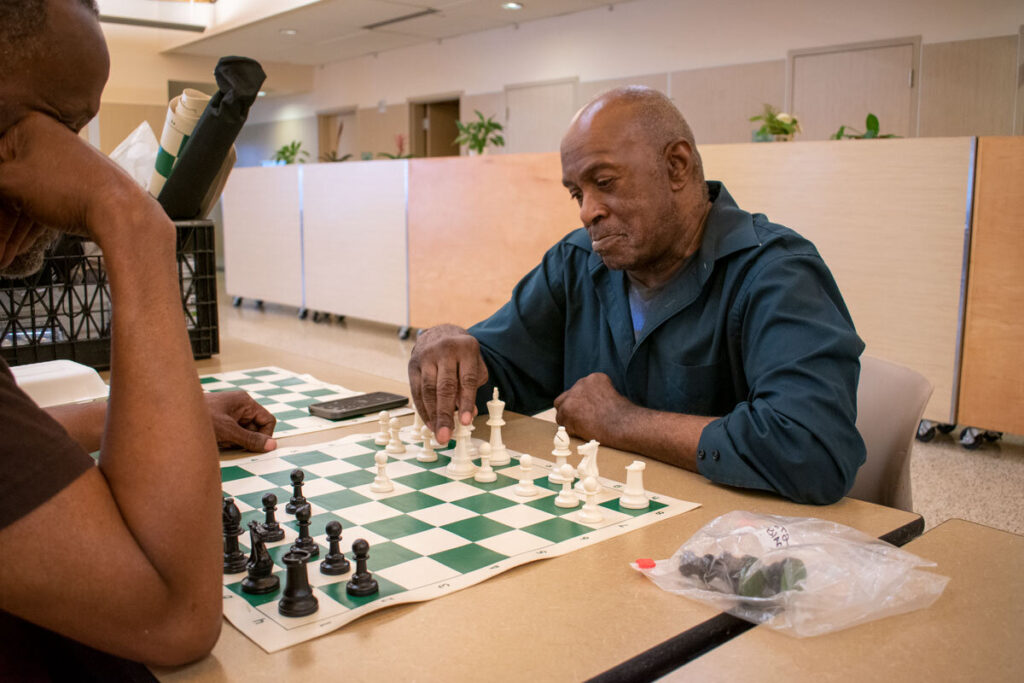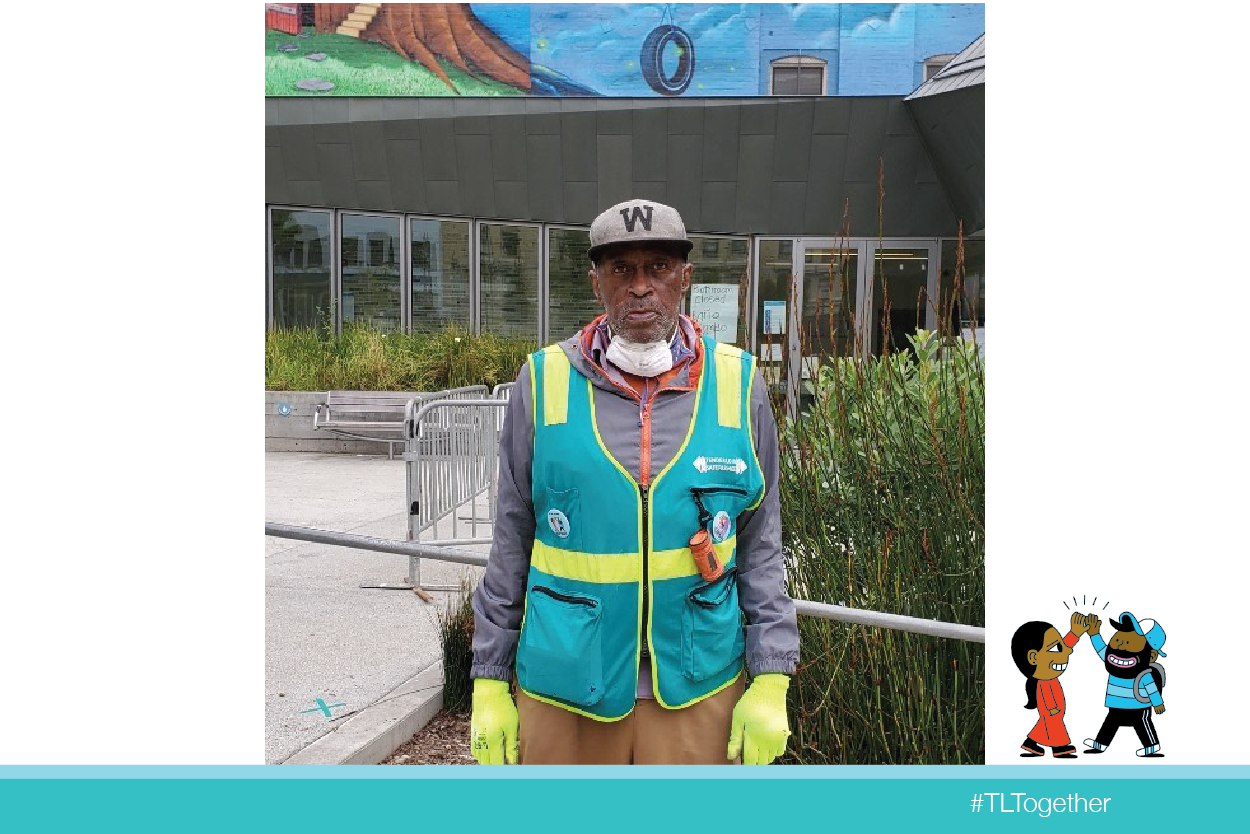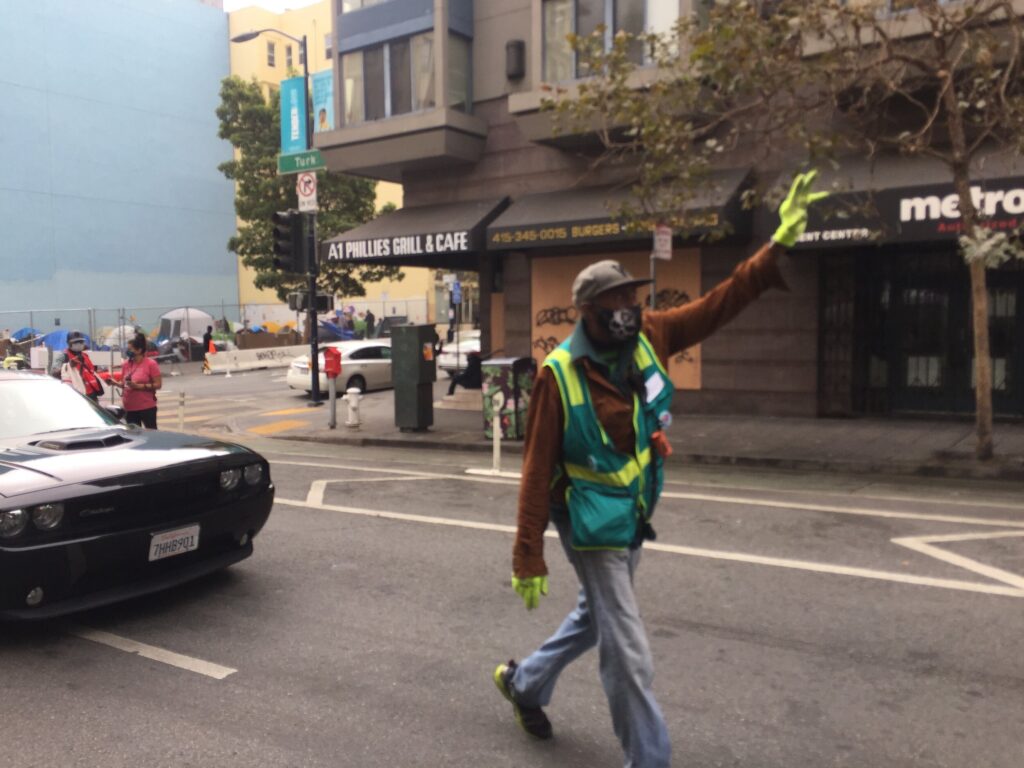This week, meet Lewis Murphy. He is a Tenderloin neighbor, veteran, and Safe Passage Corner Captain. From living on the streets to teaching chess, there’s a lot one can learn from Lewis.
Lewis speaks Korean and German, and is originally from Pennsylvania. He first came to California when he attended the Defense Language Institute in Monterey to study Korean. He passed the proficiency test but didn’t finish the class at the very end. This misstep sent him on a long road in the opposite direction to Germany, where he spent five years at various military bases around the country.
Today, Lewis lives in the Tenderloin on Golden Gate Avenue. He works with TLCBD Safe Passage five days a week; on Mondays through Thursday at Boeddeker Park and on Fridays delivering groceries from the Salvation Army Kroc Center to people living in the neighborhood.
He likes the work and sees not only the good it does for others, but also for himself. “You’re doing something and being part of society instead of withdrawing from it. You get to meet people and help them. You see elderly people who might need extra time to cross the street or the children outside of school. You need to watch them. With the little kids, if their mother turns her head, the kids can take off. So you have to be careful for them too.”
“It’s a lot better than not doing anything hanging out in a room. You get to see the kids, you get to see society. Instead of just being in your own corner of the world, you get to see the whole thing. You’re seeing different segments of society going past you all the time. The Tenderloin is a really diverse place. There are a bunch of people here—all from different backgrounds and classes. There are homeless people, a lot of kids…you can turn a corner and see a mom, then lawyers, and students going to the university [UC Hastings].”
Lewis helping to direct traffic at Play Streets
When Lewis is out in the Tenderloin he sees the streets from a lens of experience and empathy. “Some people might be leery of the neighborhood because it has a bad reputation. From my viewpoint, I’ve been homeless for a few years, I get along with everybody.”
He references a Stanford University study that resonates with him. It compares the MRI brain scans of homeless people to veterans coming home from combat in Afghanistan and Iraq. The two groups had similar signs of trauma. He touches on some of the traumas he had experienced while living on the street and hopes he never has to revisit them.
“You have to be a pretty light sleeper because people are always trying to creep up on you [when you sleep on the street]. You never feel safe because you aren’t safe. I’ve had people throw lighter fluid on me and set my tent on fire. All kinds of bad things.”
Lewis transitions the conversation with a light “what doesn’t kill you makes you stronger” anecdote and a short pause. And then he’s off to a preferred topic of choice: empathy.
“As I was explaining to my church group the other day, I have more empathy when I’m out there because I understand where these [unhoused] people are coming from. And when I’m standing on the corner, and I see someone shooting up or with a can of alcohol, and I can understand where he’s coming from. I just look at him and thank god that’s not me. But I get it. I’ve been there.”
Like many homeless veterans, Lewis talks about the challenges and red tape surrounding his ability to get his military benefits. At one point he was unable to get his discharge papers and felt it directly affected his ability to get work. “I had eight years of time in the military that was not accounted for without those papers. People thought I was hiding something and then things went rapidly downhill and that’s how I ended up homeless.”
He notes a particular day when things took a turn for the better.
“I was pushing my shopping cart down the street with my dog and here comes a police officer. They drove up to me. He had a representative from the Veterans administration in the passenger seat. New funding was just released to help homeless veterans, so they were out looking for us. She asked if I was a homeless veteran and then said ‘I’m getting you inside.’ I’d probably still be on the street if that lady didn’t come by. You can’t do anything by yourself, you always need others.”
The police officer from that day was someone who had routinely passed Lewis. “He wanted to get me off the street. We were cool. At first, he didn’t believe I was in Germany until I spoke German. And he didn’t believe I was a Korean linguist until I started speaking Korean. And then we were cool after he knew I was telling the truth.”
After about five months, Lewis started to receive HUD, Section 8, and disability support. His SSI benefits also got approved and he was able to get into a room. “Brilliant Corners was the organization that had gotten the contract from the military, to help the homeless veterans. They helped me through the whole thing.”
What might surprise some people was the difficult transition from living on the street to living in a small single-room-occupancy unit (SRO).
“That first year inside was a hard time. The dog [I had] wasn’t used to being inside, and I wasn’t either. I had been outside for a long time. I couldn’t even sleep in the bed because I was used to sleeping on the sidewalk. It was like the bed was too soft. The dog and I would sleep on the floor for the first couple of months until we finally got used to being inside.”

Safe Passage Corner Captains (Lewis is in the center back of the photo)
As far as a wish for the neighborhood, he would like to see people able to walk more freely on the sidewalks. He wants the neighborhood to be accessible for everyone.
“This is the only city I’ve been to, and I’ve been to a lot of places, where you can get away with doing drugs on a major sidewalk. Where people can’t walk down the sidewalk because people are blocking the way. And a lady with a baby carriage can’t get past because people are shooting up on the sidewalk.”

Photo & caption from Saint Anthony’s Facebook page: Lewis and Leon (pictured here) are two chess masters who bring warmth and learning to our Dining Room on Mondays during Chess Club. Both are also veterans of the military. We are grateful to you for your service and to all those who have served. #VeteransDay
For fun, and in the pre-Covid19 days, Lewis used to teach chess at Saint Anthony’s, as part of their weekly Chess Club. He looks forward to playing and teaching again in the near future and has also entertained the idea of teaching kids from the Boys and Girls Club at the same time. “Once things get back to normal maybe it’s possible. I’m teaching chess anyway and I like kids because they don’t have any preconceptions on how to play. You can teach them right. Usually, people teach you how to move but not why.”
He says the best way to learn chess is to start at the end game. First, learn the ending, then the middle, and learn the opening last, so you know the pieces and the strategy. In some ways, chess has become an analogy for life.
“We always think, ‘I wish I had known that before.’ You get older and you start looking at things differently. You look at these young people making those same mistakes you did. But you can’t say anything because they don’t want to pay attention. Nobody wants to listen to the elderly.”



Comments are closed.